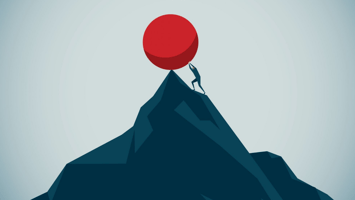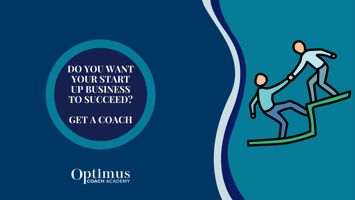We are bombarded with images of beautiful, lithe young women (and men) reclining on their yachts...
What really makes you "successful" as a coach?
One of the questions I get asked on at least a weekly basis is: "What helps someone become a successful coach?" As someone who has trained 1000s of coaches, mentored 1000s more and been in this industry for over a decade my answer may not be what you think. Yet before I start there is a question I usually reply with:
What does “successful” even mean to you?
As coaches we know that words carry different meanings for different people, so before we can talk about how to get there, we need to understand where there actually is.
Redefining Success in Coaching
For many people I speak to, “successful” means working: having paying clients, being fully booked or building a thriving coaching business. For the internet it seems to mean being on a super yacht working 1 hour a day and making zillions. Whatever your version is it's valid.
I find that when you dig deeper for most people I speak to and work with they come to coaching as they want to help people : they get meaning and purpose from supporting others to succeed. I know this was what drew me to coaching all those years ago.
In the flurry of what success "should" be we often lose sight of what coaching is and what it can do for us personally as well as professionally. As I say time and time again coaching skills are life skills and if we all had them (and used them regularly) the world would be a much better place.
Coaching skills are so much more than the job title of "coach" . They’re about:
-
Holding space with curiosity
-
Asking powerful questions
-
Seeing the world through someone else’s lens
-
Listening with depth and presence
-
Exploring intuition and emotions
Great coaching skills go beyond the cognitive and include whole person approaches which explore emotions, intuition and what is going on the body. They are informed by Psychology, Neuroscience and Somatics which all support a depth of listening and curiosity.
And yet, when we start thinking about coaching as a business we can slip into the mindset that we need to “do” more. Share more. Prove more. Especially if we believe that offering value means giving answers rather than holding space. A trap I see so many new coaches falling into is that they have to give their clients answers to be valuable : sometimes coaching combines perfectly with other modalities and the approach adds to mentoring, consulting, training, facilitation and leadership yet as a pure coach we don't need to add more.
That shift from learning to being a coach often feels like we’re stepping into a different identity altogether. And for many, that feels jarring which is why defaulting to a knowledge base or being more directive can come more easily.
If you're thinking about success as a coach how much are you embodying the skills and mindset of a coach? let's explore this a bit more..
Strategy Isn’t the Hard Part
If you're building a coaching business : let’s get this clear: strategy isn’t rocket science although often it's the thing which we perceive is holding us back.
You can ask ChatGPT or google. You can work with a mentor or strategist or do a course. The basic building blocks are the same for any business:
-
Know your audience
-
Build relationships
-
Communicate your value
-
Convert and deliver
That’s it, as much as I'd love to say there's a secret formula or magic funnel there isn't all businesses need to meet the needs and desires of their target audience and they need to build relationships with them and then deliver the goods. As a coach if you want to have a business you need to choose a way to be visible : this can be via social media, networking, partnerships, advertising, your network or a combination and the visibility needs to link to your target audience. I could go on but you get the picture!
So if the strategy isn’t the barrier what is?
The Inner Work Is the Game-Changer
The real difference between coaches who thrive and coaches who stall often comes down to this: How well do you know yourself?
You’ve probably heard the saying: You can only go as deep with your clients as you’ve gone with yourself. It might sound cliché, but it’s true and it's why in our training courses we focus on all our students doing the work too and having a lot of coaching. This can sometimes be met with resistance as the coaching part means you have to do the work which can feel challenging at times.
When you know who you are: our strengths, your values, your preference, your triggers you coach differently. You market differently. You show up differently. This is why I believe self awareness is the core of success as it allows you to really understand yourself and seek to understand others.
I always encourage our trainees to do the work on themselves. Not just to tick a box or because it’s part of the curriculum but because self-awareness is what unlocks your unique coaching presence. The key part here is unique : every coach is not the same and when you know who you are you can show up authentically as you which is so much more attractive and easy than wearing a mask you feel you should be.
Some great self reflection questions include
-
What lens do I use to view the world?
-
What biases or assumptions am I bringing?
-
How has my personal and professional experience shaped the way I coach?
-
How would I like people to view me?
-
What are my core values?
-
What are the unique strengths and skills which I bring?
Your Whole Self Is Your Superpower
When I first started coaching, I thought I had to wear a “professional coach” hat. I became more formal, less relational and I held back the parts of me that make me… me.
But over time, I realised something important: When I let myself be fully me, within boundaries and professionalism, my clients got better results. The relationship deepened and I was able to build trust more quickly and communicate more effectively.
The thing is no one else is you and there is a confidence about owning who you are and playing to your strengths. When you are able to demonstrate this as a coach you're giving your clients permission to show up in this way as well which deepens trust and relatedness.
Equally, if you don't know who you are as a coach or you are showing up with a mask on it's much harder to build relationships with clients as well as to listen and be present at a deeper level as you won't be able to pick up on and perceive what is the clients and what is yours.
This is the difference that makes the difference.
Success Starts Within
So if you’re a newer coach wondering what it takes to grow, start with this:
-
Get curious about who you are, not just what you do: what are your strengths, values and drivers. When are you most motivated and what tends to throw you off course?
-
Get coaching and really allow yourself to be coached: be curious and open
-
Reflect on your own coaching : recognise patterns and how you are with different clients and get supervision regularly (in our training programs mentoring has a supervisory slant) Use this a space to help you develop as "you"
-
Don’t mould yourself to be like other coaches: you don't need to be like others instead evolve into the coach you already are.
-
Remember that your past experience is important : don't discount your 20 year career or your other skills these all form part of who you are
Because building a sustainable coaching business isn’t about finding some external “secret.” It’s about doing the inner work, so you can show up, serve powerfully, and grow with congruence. So if you're a new coach reaching for another business course take a step back and reflect on who you are and what you really need: you may be surprised!
If you’re ready to grow as a coach from the inside out, we’d love to support you at Optimus Coach Academy. Our ICF-accredited coaching programmes are rooted in psychology, whole-person growth, and evidence-based frameworks so you can develop both your skillset and your self. In fact one of the side effects of our training which many of our students share is personal development and personal growth.
If you want to listen to my episode on the Coaching Hub podcast on this topic you can do so here https://open.spotify.com/episode/3pXsuA4N9Wovht14HkLKxb?si=B_XgPsHHReeqAbSlbtMaBg
To find out what we offer at Optimus click here https://www.optimuscoachacademy.com/




